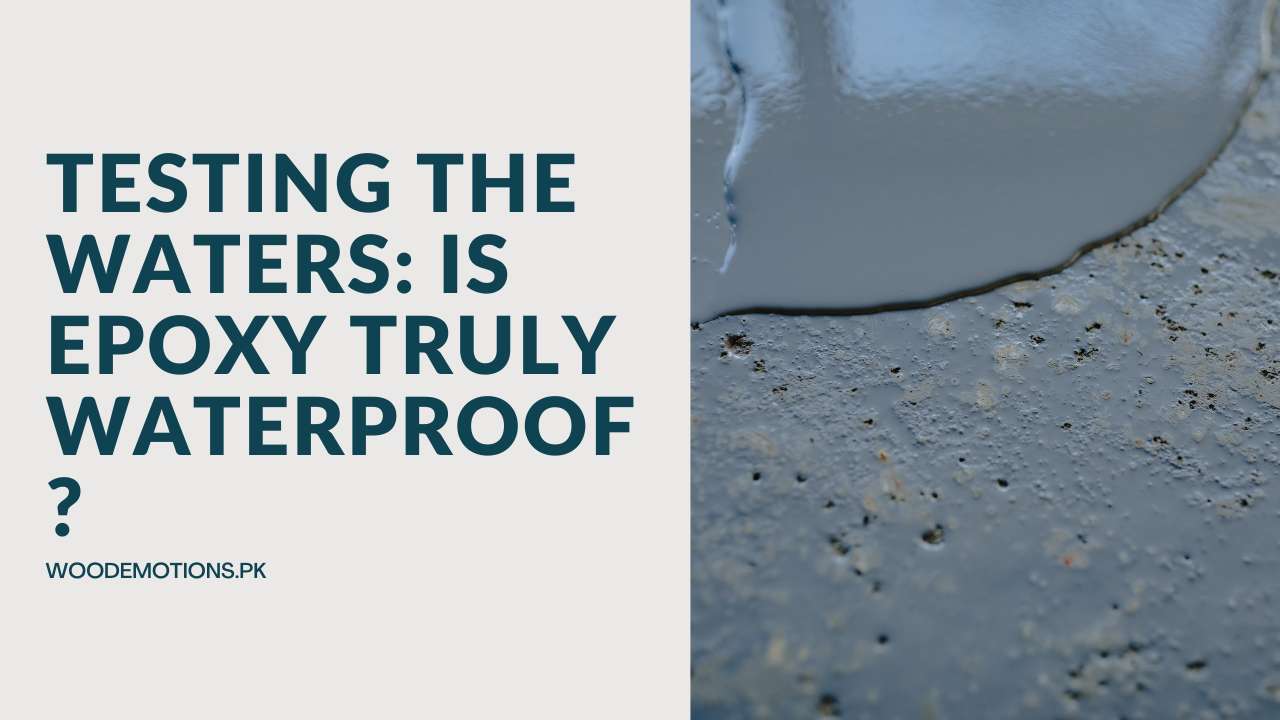Let's dive into epoxy flooring and answer the question: is epoxy waterproof? Epoxy flooring has gained immense popularity in residential and commercial settings for its durability, aesthetics, and versatility. But when it comes to waterproofing, is epoxy up to the task?
Yes, epoxy is waterproof once fully cured, making it an ideal choice for sealing surfaces against water damage in various applications.
In this article, we explore the properties of epoxy coating, its ability to resist water and its applications in various settings. Through this exploration, we aim to provide a comprehensive understanding of the waterproofing capabilities of epoxy coating and its suitability for different purposes.
Is Epoxy Waterproof?
Let me provide you with a detailed explanation so that you can have a clear understanding of the concept. Let's dive into it.
Epoxy resin stands out as an exceptionally water-resistant material, particularly in pavement sealing and repair tasks. However, it's essential to clarify that while epoxy is highly resistant to water, it falls short of being completely waterproof. So, what sets the two apart?
Understanding Water Resistance

When we talk about water resistance, we refer to a material's ability to withstand the infiltration of water up to a certain degree. In the case of epoxy, it forms a robust barrier that effectively blocks water from seeping through surfaces.
This characteristic makes epoxy resin an invaluable choice for sealing surfaces and safeguarding them against moisture-related issues like rot, decay, or corrosion.
- Epoxy's Limitations
Despite its impressive water resistance, epoxy resin isn't entirely impervious to water. Extended submersion in water can eventually lead to its penetration.
However, it's crucial to note that epoxy can be optimized with proper surface preparation and professional application techniques to achieve the highest degree of water resistance possible.
Ensuring Maximum Water Resistance
- Surface Preparation
Achieving optimal water resistance with epoxy begins with thorough surface preparation. This process involves cleaning and priming the surface to ensure maximum adhesion of the epoxy coating. Any dirt, grease, or contaminants must be removed to guarantee a solid bond between the epoxy and the substrate.
- Professional Application Techniques
The application of epoxy requires precision and expertise to ensure its effectiveness in resisting water.
Professional installers are well-versed in the proper techniques for applying epoxy coatings, including ensuring uniform coverage and adequate curing. These measures significantly enhance the epoxy's ability to repel water effectively.
If you need further assistance, visiting this forum would be the best resource as it discusses waterproofing concrete with epoxy paint, offering valuable insights and practical advice on utilizing epoxy coatings for waterproofing purposes.
Benefits of Waterproof Epoxy Flooring
Before we dive into the benefits of waterproof epoxy flooring, I'd like to mention that we have our own epoxy collection. You can visit it for further information. Now, let's explore the numerous advantages it offers.
1. Protection Against Moisture Damage
One of the primary advantages of waterproof epoxy flooring is its exceptional ability to safeguard surfaces against moisture damage.
Whether it's a residential basement, commercial kitchen, or industrial facility, epoxy flooring forms a robust barrier that prevents water from seeping through, minimizing the risk of mold, mildew, and structural damage.
2. Enhanced Durability
Waterproof epoxy flooring is renowned for its durability and longevity. Once correctly installed, it can withstand heavy foot traffic, impact, and abrasion, making it ideal for high-traffic areas.
Its resilience ensures long-term performance, reducing the need for frequent repairs or replacements and saving both time and money in the long run.
3. Easy Maintenance
Maintaining waterproof epoxy flooring is a breeze. Its seamless surface minimizes the accumulation of dirt, dust, and debris, making it easy to clean with simple mopping or gentle scrubbing.
Unlike traditional flooring materials that may require specialized cleaning products or extensive maintenance routines, epoxy flooring offers hassle-free upkeep, allowing you to enjoy your space more and clean less.
Because we are talking about maintenance you must check out: How To Get Shine Back On Epoxy Floor
4. Versatility in Applications

Another significant advantage of waterproof epoxy flooring is its versatility in applications. Whether it's a residential garage, a healthcare facility, or a commercial showroom, epoxy flooring can be customized to suit various environments and aesthetic preferences.
With a wide range of colors, textures, and finishes, you can create a seamless and visually appealing flooring solution that complements any space.
wanna know how epoxy flooring is done ?
Waterproof epoxy flooring shines in environments where exposure to chemicals is a concern, such as laboratories, manufacturing plants, or automotive workshops.
Its inherent resistance to chemicals, oils, and solvents ensures that spills and stains can be easily wiped away without causing damage to the floor. This feature not only maintains the integrity of the flooring but also contributes to a safer and more hygienic environment for occupants.
6. Improved Safety
Waterproof epoxy flooring can also enhance safety in various settings. With options for slip-resistant additives, epoxy flooring provides traction underfoot, reducing the risk of slips, trips, and falls, even in wet or oily conditions.
This feature is particularly beneficial in areas where safety is a priority, such as commercial kitchens, pool decks, or industrial workspaces.
Is Epoxy Flooring Waterproof
Yes, once cured, epoxy resin is indeed waterproof.
Once the epoxy has finished bonding and curing, it forms a solid and impenetrable barrier that effectively prevents the penetration of nearly any liquid or solid material, including water and humid air.
This inherent waterproofing property makes epoxy a popular choice for various applications, including:
- Garage Flooring: Epoxy flooring is commonly used in garage spaces due to its ability to withstand exposure to water, oil, and other liquids commonly found in automotive environments.
- Shower Walls: Epoxy coatings are often applied to shower walls to provide a seamless, waterproof surface that is easy to clean and maintain.
- Outdoor Table Tops: Epoxy coatings can seal and protect outdoor table tops from moisture damage, ensuring their longevity and durability in outdoor settings.
Once the epoxy resin has fully cured, it becomes waterproof, making it an excellent choice for a wide range of applications where protection against water damage is essential.
Adding another forum for your reference. It should help clarify your understanding based on the article, and if you seek further information, you can visit this forum.
Let's proceed to the FAQs covered below!
FAQs
1. Can epoxy flooring be applied outdoors?
Yes, epoxy flooring can be used outdoors, but it requires specific formulations and proper installation techniques to withstand exposure to sunlight, temperature fluctuations, and moisture.
2. How long does epoxy flooring last?
With proper installation and maintenance, epoxy flooring can last up to 20 years or more in residential, commercial, and industrial environments.
3. Is epoxy flooring slippery when wet?
While epoxy flooring can be slippery when wet, additives can be incorporated into the epoxy mixture to increase slip resistance and improve safety, especially in areas prone to water exposure.
4. Can epoxy flooring be repaired if damaged?
Yes, damaged epoxy flooring can be repaired by patching or reapplying epoxy to the affected areas. However, addressing any issues promptly is essential to prevent further damage and maintain the floor's integrity.
5. Is epoxy flooring environmentally friendly?
Epoxy flooring is considered environmentally friendly due to its low VOC emissions and long lifespan, which reduces the need for frequent replacements and minimizes waste. However, it's essential to choose epoxy formulations prioritizing sustainability and environmental responsibility.
Conclusion
Epoxy is unequivocally waterproof once fully cured, rendering it an excellent solution for sealing surfaces against water damage across diverse applications. Its impermeable nature makes epoxy indispensable for safeguarding against moisture-related issues, ensuring durability and longevity in various environments.
REFERENCES








